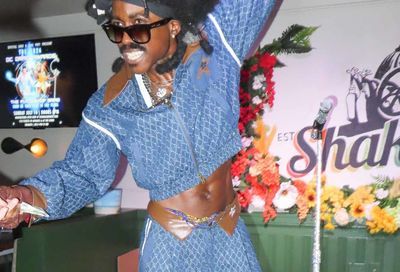‘Sweat’ at Keegan Theatre Review: Labor Pains
Anchored by terrific lead performances, Keegan Theatre's 'Sweat' turns up the heat in a drama roiled by race and class division.

Women bear a heavy burden for keeping the faith and the peace in Lynn Nottage’s Pulitzer-winning drama Sweat (★★★☆☆), staged to duly tense effect by Angelisa Gillyard at Keegan Theatre.
Friends Tracey (Susan Marie Rhea) and Cynthia (Lolita Marie), coworkers for decades at a steel plant in Reading, Pennsylvania, are breadwinners for their families — wives and mothers who pull their weight on the line, and at home. Yet, for all their diligence and dedication, they can’t be responsible for a husband’s addictions or a son’s violent impulses. They can only live with the sometimes devastating consequences of their men’s actions.
And neither can control or much influence how they’re treated by their bosses at the plant, where a labor dispute brings simmering tensions between friends, family, and fellow citizens to a steaming boil. Tracey and Cyn don’t necessarily get the worst of what goes down in their favorite bar on the night hostilities finally explode into physical violence, but they’re left holding the broken pieces.
Also, their friendship is tested in ways that add even greater complexity to these roles for performers Rhea and Marie, who acquit themselves brilliantly as Tracey and Cyn, often forming a fabulous trio with Santina Maiolatesi, as Jessie, the pair’s gin-soaked bar buddy and coworker. Those bonds are tested, too, when Cyn and Tracey are pitted against one another for a possible promotion to management.
The story toggles between events in 2000 leading up to that fateful night at the bar, and the aftermath eight years later. By then, some of those affected have embarked on hopeful new chapters, while others have succumbed to unemployment and financial distress, or depression and the opioid crisis.

Nottage, who based the 2015 play on interviews she had conducted four years earlier in Reading — officially one of the poorest cities in America, according to the 2010 U.S. Census — keeps the topical pot stirring. Labor layoffs, racial resentments, and anti-immigrant sentiment all disrupt this blue-collar burg where regular salaries and pensions had funded a comfortable middle-class existence for generations, until recently.
Sweat captures this precise cultural moment not only in dialogue referencing NAFTA and Bush v. Gore, but with its noticeably social media-free depiction of a world where fast-evolving technology threatens to leave laborers languishing behind.
In the face of so much struggle, the ladies and their crew just want a drink sometimes — a reality warmly reflected in Matthew J. Keenan’s bar set where the majority of the play takes place. A watering hole for locals, with a jukebox to one side and an American flag hanging on the other, the bar evokes the sense of community these characters cling to, the place they go to feed their joy and to soothe their sense of powerlessness.
The men, for all their bluster and brutality, are the ones most susceptible to that downdraft of waning fortunes and opportunities. Cyn’s husband Brucie (DeJeanette Horne) and son Chris (Jamil Joseph), and Tracey’s son Jason (Bowen Fox) all feel either locked out of economic opportunity or stunted in their efforts to build a life beyond the factory. Bartender Stan (Jon Townson) was left literally hobbled by an accident he suffered when he worked at the plant.
The entire ensemble, including Andrés F. Roa, as Colombian-American barback Oscar, serves the story effectively (though without much of the humor indicated in the script). But it’s really the women who carry the show.
The unspoken distance between actor and character diminishes sharply watching Marie’s careful, contained Cyn, and it vanishes entirely watching Rhea tear shit up as blowzy, boozy Tracey, the sort who starts a conversation with “I’m not prejudiced but…” — a phrase that never ends well for anyone speaking it.
Gillyard’s production doesn’t exactly end well, as the performance just goes dark without a marked sense of conclusion. But Nottage’s play still makes profound points on the strength of a pair of lead performances that reveal uncomfortable facets of those working towns where the work has been shut down.
Sweat runs through Sept. 16, at The Keegan Theatre, 1742 Church St. NW. Tickets are $50, with discounts available. Visit www.keegantheatre.com.
Support Metro Weekly’s Journalism
These are challenging times for news organizations. And yet it’s crucial we stay active and provide vital resources and information to both our local readers and the world. So won’t you please take a moment and consider supporting Metro Weekly with a membership? For as little as $5 a month, you can help ensure Metro Weekly magazine and MetroWeekly.com remain free, viable resources as we provide the best, most diverse, culturally-resonant LGBTQ coverage in both the D.C. region and around the world. Memberships come with exclusive perks and discounts, your own personal digital delivery of each week’s magazine (and an archive), access to our Member's Lounge when it launches this fall, and exclusive members-only items like Metro Weekly Membership Mugs and Tote Bags! Check out all our membership levels here and please join us today!
























You must be logged in to post a comment.